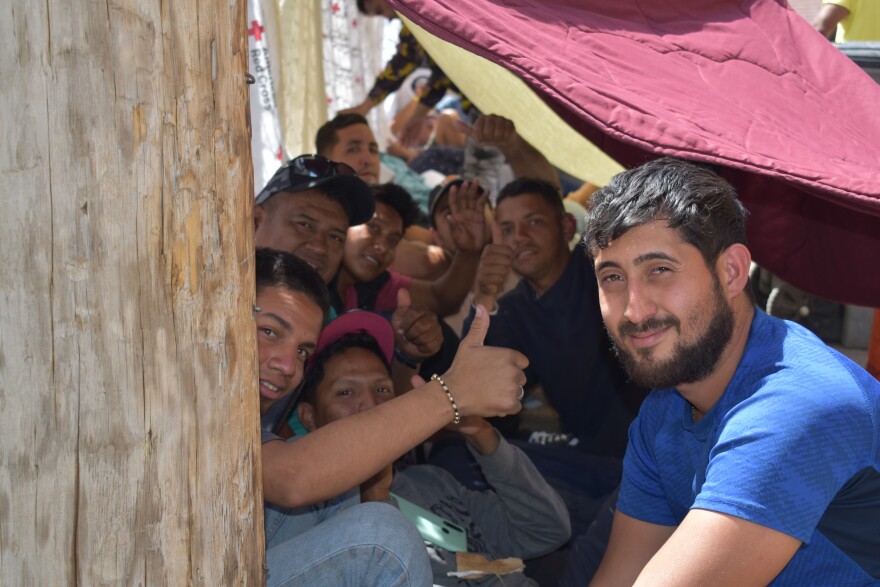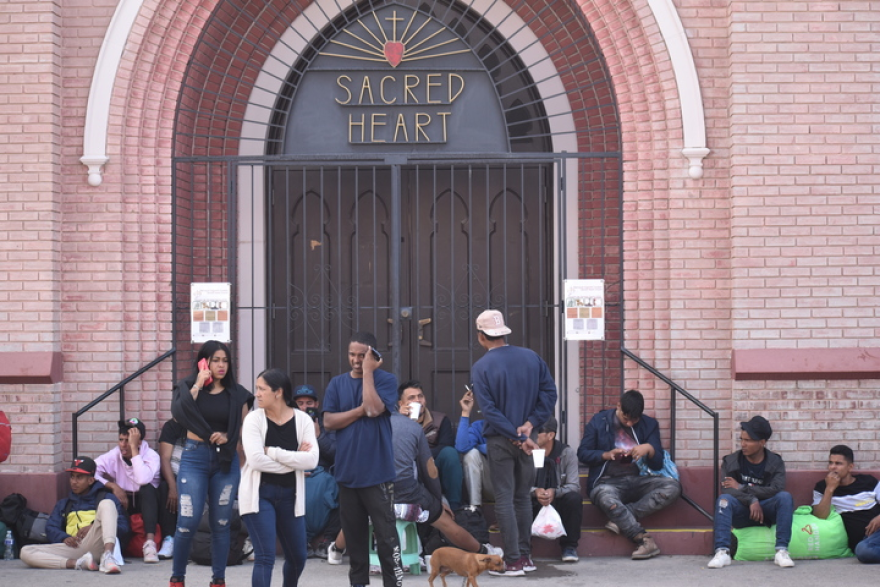Yormari Cajo has been sleeping on the streets of downtown El Paso since she crossed into Texas from Ciudad Juarez on Saturday. It hasn’t been easy — she’s out of money and isn’t sure how she’ll get to New York, where she said family and friends are waiting for her.
But late Tuesday morning Cajo, who left Venezuela earlier this year, had a reason to smile. In a manila envelope, she held new paperwork that would allow her to travel without fear of deportation beyond the federal checkpoints surrounding El Paso County.
“I have my [asylum] application and I’m trying to see if there are other [organizations] that help people continue on their journey,” she said. If not, she added, she’ll try to find work in El Paso and save up for a ticket.
Cajo is one of hundreds of migrants who, in the last week, have made the sidewalks outside of El Paso’s Sacred Heart Church their temporary home. Shelters are at capacity. And even if they weren’t, Cajo said some migrants prefer to stay outside.
While the number of asylum seekers arriving in El Paso has local officials scrambling to ensure safety for migrants and city residents, officials are preparing for an even larger influx. The pandemic-era rule known as Title 42 is scheduled to be lifted May 11 at 11:59 p.m.
Like Cajo, many didn’t wait for the policy — which allows federal officials to rapidly expel migrants — to end before entering the U.S.
“What I’ve heard is that they’re going to deport people,” she told The Texas Newsroom when asked why she chose to cross the Rio Grande instead of waiting.
The Department of Homeland Security announced last week it will increase its enforcement and removal efforts as it anticipates a spike in unauthorized crossings. Those measures include expedited removal for migrants caught crossing into the country without authorization. Migrants who are deported under the new policy could be barred from trying to enter the country for five years and could also be barred from seeking asylum in the United States.
Cajo said she has friends waiting in Mexico until Title 42 ends. She hopes they make it, but considers herself lucky that she’s in Texas already.
For others, like Jesus Albujas Mendoza, 33, the wait for Title 42 to end was too long. After leaving Venezuela in November 2021, he arrived in Chile and worked there for a few months before venturing out for the United States. Once he arrived in Mexico, Mendoza said he tried to schedule an appointment with immigration officials through CBP One, a smart phone application launched by Customs and Border Protection that expanded to include migrant applications in January. But the system has been plagued with problems due to connectivity issues and site glitches.
“I tried to cross by using CBP One since [ I applied] January 15th,” he said. It didn’t work, so he tried another way.
“I fell off the border wall” after trying to cross, said Mendoza.
After recuperating, he eventually turned himself in to the authorities and applied for asylum. He’s now Kansas City bound once he finds money for bus fare.
Mendoza doesn’t intend to stay in the United States for more than a few years. He explained he’s just hoping to find work and eventually return to South America. Venezuela, however, isn’t an option due to what he called his criticism of the federal government.
“If you don’t make the sacrifice to get here, then you don’t receive the benefits we’re all searching for,” he said.

Strain on local resources
The number of migrants that have crossed into El Paso in the days leading up to the end of Title 42 forced the city to issue a state of emergency.
“We’re getting prepared now for what we call the unknown. And the unknown is what will happen after May 11,” El Paso Mayor Oscar Leeser said during a news conference Sunday when he announced the emergency declaration.
The declaration allows the local government to draw down federal resources to help deal with the influx and activate emergency shelters, including two vacant school buildings the city is fashioning as temporary housing.
But if migrants haven’t been processed by immigration officials, they won’t be allowed into the government-run shelters. That rule is what’s prompted some migrants to instead sleep outside near the church.
If the scene on Tuesday is any indication, downtown businesses and residents should expect a continuous presence of law enforcement as local police and Department of Public Safety officers patrol around the church. It’s had a chilling effect on some of the migrants, who said they now fear leaving the sanctuary offered close to Sacred Heart.
“We’re limited to the surrounding areas of the church,” said Miguel Cordova. “If we go a few blocks, we’re outside of it.”
Cordova, who is also from Venezuela, said he’s seen police detain migrants who venture outside of what they consider a “safe zone.” The warning didn’t come from official channels, but instead through other migrants. On Tuesday, a human rights advocate who asked not to be named, said warnings have been given out to some migrants advising them not to leave the area. Without legal status, an arrest for even a minor crime could lead to a fast deportation, the advocate said.
It’s unclear how long El Paso will be considered ground zero for this humanitarian crisis. A similar scene played out last winter when hundreds of migrants were forced to sleep on sidewalks during sub-freezing temperatures.
The Biden administration is also ramping up its efforts in preparation for the end of Title 42. The White House announced it is sending 1,500 active-duty troops to the border with Mexico to aid immigration and border agents in processing and vetting migrants. It’s unclear still how many will come to Texas, which is already saturated with state law enforcement and Texas National Guard units who are part of Gov. Greg Abbott’s Operation Lone Star.
The federal deployment was immediately denounced by immigrant rights groups who argue Biden is continuing the enforcement-only policies of his predecessor.
“Once again we are witnessing the Administration’s refusal to offer concrete solutions in favor of deterrence measures, completely distorting any meaningful access to safety for the families who are crossing,” said Jennifer Babaie, the director of advocacy and legal services at Las Americas Immigrant Advocacy Center. “We’ve seen this before and we know this will only subject migrants to more risk. Militarization and law enforcement are not the answer - meaningful access to humanitarian protection is.”
Despite the political turmoil and the uncertainly for many about what happens next week or beyond, Jon Castillo, an immigrant also from Venezuela, said he and his fellow asylum seekers were banding together and keeping their heads up.
In a makeshift alleyway tent made of blankets and tarp, Castillo and several others passed around milk and a box of cereal.
“We make a collection. Everyone helps,” he said. “We all help each other.”



